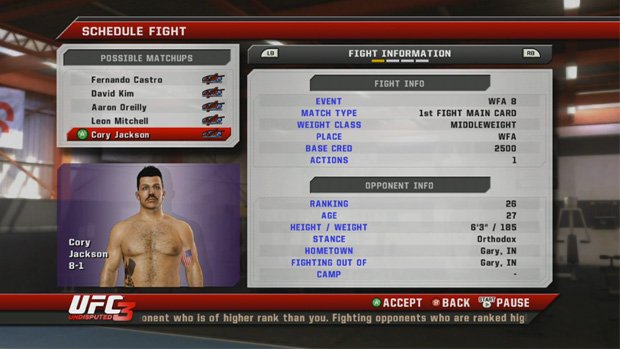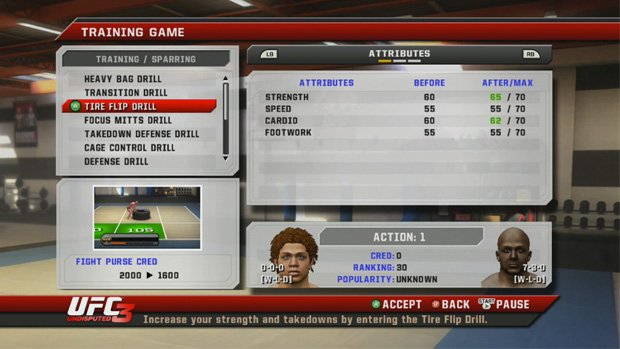UFC Undisputed 3 career mode guide
Go from being a nobody to a somebody with our career guide
Your First Fight
Now that you’ve entered the world of professional mixed martial arts, it’s time to schedule a fight. You’ll begin your career in the World Fighting Alliance, a sort of minor league system for the UFC. Here you’ll face off against a series of computer-generated fighters in an effort to prepare you for the eventual call-up to the big leagues. When scheduling a fight, there will be up to five different opponents to choose from. You can view each of the fighters’ respective rankings, records, attributes, fight history (for the last three fights), and method of victory. You’ll also be able to see some details on the fight card, including how much you’ll earn for the fight, and where on the card you’ll be fighting.

Each fight will have a few undercard fights, a few main card fights, and a main event. The major difference between the fights is how much cred you’ll make at the end of the event. Cred is Undisputed’s monetary system, and the bigger the fight, the more you’ll make. Every fight you schedule has a base amount of cred that you will earn no matter what. Winning will typically double the cred you earn, and you can also win nightly awards for knockout, submission, or fight of the night. Saving up cred will be a big help later on when purchasing upgrades, so during this early stage of your career, you should always take the fight with the biggest payout. Many of the WFA computer fighters are easy opponents, so you may as well make as much money as you can early on. After you look at all the factors and choose an opponent, it’s time to start training.
There are three things you can do to prepare for a fight. Training sessions allow you work out with the hopes of increasing your stats and attributes for the long term. Game plans help you earn a temporary one-fight boost of attributes and stats. Camp sessions will allow you to travel to one of six real fight camps to learn new technique moves for your fighter. Doing any of these three things will use up one action. Typically, you will have two actions to use to get ready for a fight. For your first three fights, you only get one action as a part of the game’s tutorial. Even if you have already completed one career, you will only ever get one action for your first three fights.
It’s important to make the most out of your actions, which can be rather difficult considering the handcuffs the game puts on you during the early stages of your career. Since your fighter has a limited amount of technique moves, it’s best to do camp sessions the first three chances you have. Now, you won’t be able to choose what you spend your actions on during the very first career you start because of the game’s tutorial. To get around this, simply start a career with a roster fighter, and go through the first three fights of a career just to get them over with. You’ll learn a bit more about how each of the pre-fight sessions works, and also have a chance to see how well you handle the difficulty settings you chose. By visiting a camp during the first three actions available to you, not only will you learn a valuable new technique move, but you’ll also be able to level it up to be more powerful. We’ll get to that in a moment, though.

You have to make it past your first fight before you can worry about the next one. No matter which of the opponents you chose for your first battle, the man on the other side of the octagon shouldn’t provide you with too much trouble. This is an excellent opportunity to test out your specific technique moves. Instead of rushing for a flashy knockout victory in the first few minutes, why not take the time to get your signature moves down pat? If you’re a striker, obviously you’ll want to go full bore with the striking. However, if you chose a style that is more focused on the ground game, you should be utilizing those abilities almost exclusively until they become second nature to you. By the end of your first fight, you should have a strong sense of who your fighter is in the octagon, which will allow you to better train for subsequent fights, and the rest of your career.
Weekly digests, tales from the communities you love, and more


